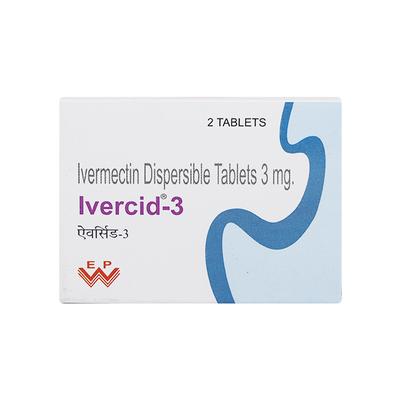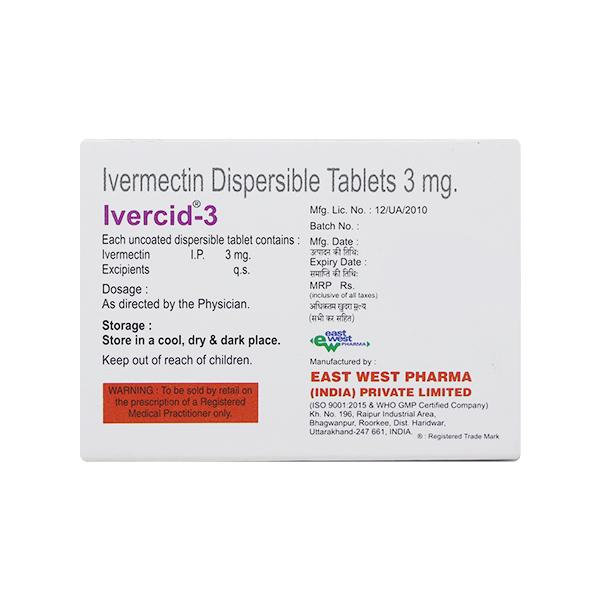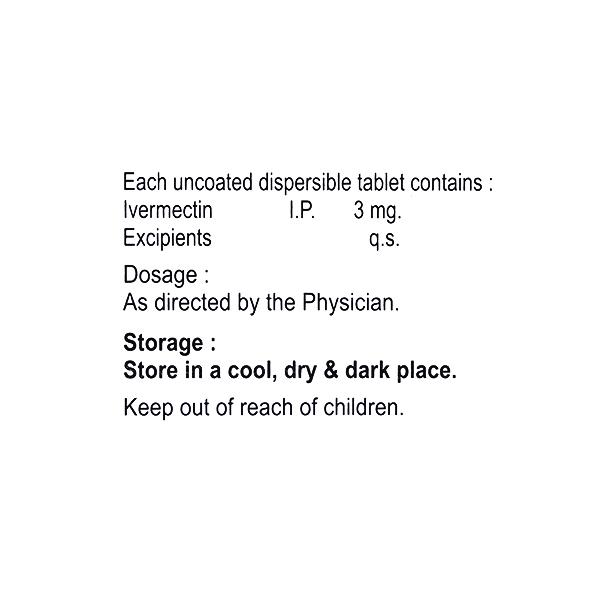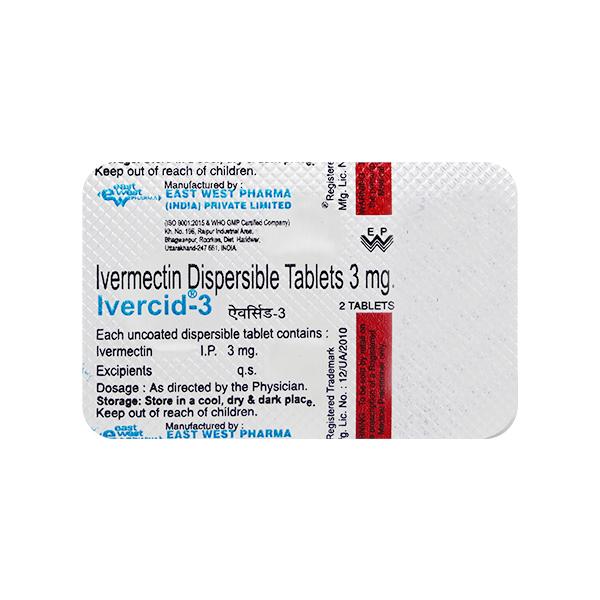

Netmeds First Membership
Quick Links
Introduction About IVERCID 3MG TABLET
IVERCID 3MG TABLET contains Ivermectin which belongs to the group of medicines called Antiparasitic agents. It is used to manage parasitic infections like intestinal strongyloidiasis (infection in gut caused by a type of round worm called strongyloides stercoralis), infection caused by Wuchereria bancrofti in blood and tissues and human scabies (infectious disease of the skin) after previous management has failed. It is also used for the management of Onchocerciasis (known as river blindness, parasitic disease caused by Onchocerca volvulus).
Before taking IVERCID 3MG TABLET, inform your doctor if you have a condition called loa loa (eye infection) or have a weak immune system and taking any other medicines for other conditions.
IVERCID 3MG TABLET is not recommended for use in pregnant and breastfeeding women unless advised by the doctor. Contact your doctor before taking this medicine.
The safety and effectiveness of IVERCID 3MG TABLET in children weighing less than 15 kg has not been evaluated. IVERCID 3MG TABLET should be used with caution in elderly patients (aged 65 years and above).
The most common side effects of taking IVERCID 3MG TABLET are diarrhea, nausea, dizziness, itching and fast heart rate. Consult your doctor if any of the side effects worsen.
Uses Of IVERCID 3MG TABLET
It is used to manage:
- intestinal strongyloidiasis
- parasitic infection caused by Wuchereria bancrofti in blood and tissues
- human scabies after previous management has failed
- onchocerciasis (river blindness)
How IVERCID 3MG TABLET Works
IVERCID 3MG TABLET works by binding to the nerve and muscle cells of parasites leading to their death, thus helps to manage various parasitic infections.
How to use IVERCID 3MG TABLET
Take IVERCID 3MG TABLET as advised by your physician.
For Tablet: Swallow IVERCID 3MG TABLET with a glass of water. Do not crush or chew the medicine. But in children younger than 6 years, the medicine should be crushed before swallowing.
For Dispersible Tablet: Disperse IVERCID 3MG TABLET in the specified quantity of water as advised by your doctor. Consume the mixture immediately after reconstitution.
Dose and duration will be decided by your doctor depending upon your age, body weight and disease condition.
Side Effects Of IVERCID 3MG TABLET
Common
- diarrhea
- nausea
- dizziness
- joint pain, synovitis
- axillary lymph, inguinal or cervical lymph node enlargement and tenderness
- itching
- edema, facial and peripheral edema
- papular and pustular or frank urticarial rash
- fever
- inflammation of the corneal limbus
- fast heart rate
- low blood pressure when standing up from sitting or lying position (orthostatic hypotension)
Uncommon
- abnormal physical weakness
- stomach pain
- sleepiness, vertigo (spinning sensation of the head)
- shakiness
- rash, urticaria
- headache, muscle pain
Rare
Stop taking IVERCID 3MG TABLET and contact your physician immediately if you experience any of the following side effects:
- allergic reaction (such as rash, hives, itching, sudden fever and difficulty breathing)
How To Manage Side Effects
Headache:
Drink ample amount of water and avoid skipping meals. Get adequate rest. Try to be relaxed and stress free. Apply pain relieving balm on your forehead if necessary. Consult your doctor if the symptom does not improve.
Diarrhea:
Drink lot of fluids such as water or fruit juices to keep yourself hydrated. Avoid taking any medicine on your own for managing diarrhea. Consult your doctor if the symptom did not improve.
Stomach pain:
Rest and relax. Eat and drink slowly or try to have smaller and frequent meals. Keep a heat pad on your stomach. Do not self-manage on your own and consult your doctor if the symptom did not improve on its own.
Dizziness:
Try to rest and relax. Get enough sleep. Avoid driving or operating any tools or machines while you are feeling dizzy. Do not consume alcohol as it can aggravate your dizziness. Consult your doctor if the symptom did not improve.
Warning & Precautions
Pregnancy
IVERCID 3MG TABLET is not recommended for use during pregnancy unless it is considered clearly necessary. Contact your doctor before taking IVERCID 3MG TABLET.
Breastfeeding
IVERCID 3MG TABLET is not recommended for use in breastfeeding women unless it is considered clearly necessary. Contact your doctor before taking IVERCID 3MG TABLET.
Driving and Using Machines
Do not drive or operate any machines if you feel dizziness, drowsiness or feeling shaky or spinning sensation after taking IVERCID 3MG TABLET.
Allergy
Do not take IVERCID 3MG TABLET if you are allergic to Ivermectin or any other ingredients of this medicine. It should be used with caution in patients with other substances such as foods, preservatives or dyes.
Others
Before taking IVERCID 3MG TABLET, inform your doctor if you have:
- a condition called loa loa (eye infection)
- a weak immune system (immunity disorder)
Use in pediatrics:
The safety and effectiveness of IVERCID 3MG TABLET in children weighing less than 15 kg has not been evaluated. In children under 6 years of age, the medicine should be crushed before swallowing. Consult your child doctor for advice.
Use in geriatrics:
IVERCID 3MG TABLET should be used with caution in elderly patients (aged 65 years and above). Contact your doctor before taking IVERCID 3MG TABLET.
Interactions
A. Drug - Drug interactions:
Before taking IVERCID 3MG TABLET, inform your doctor if you are taking any of the following medicines:
- diethylcarbamazine citrate (DEC) (used to manage lymphatic filariasis)
- warfarin (used to manage blood clots)
B. Drug – Food interactions:
Do not take food 2 hours before or two hours after taking IVERCID 3MG TABLET.
Overdosage:
If you or anyone else accidentally take too much of IVERCID 3MG TABLET, consult your doctor immediately or visit the nearby hospital. Symptoms of overdose include rash, urticaria, contact dermatitis, oedema, headache, dizziness, abnormal physical weakness, nausea, vomiting, abdominal pain, diarrhea, fits, impaired coordination, breathing difficulty, tingling or prickling sensation in the arms, hands, legs or feet, decreased alertness, sleepiness or drowsiness, altered consciousness, coma, confusion, disorientation and death.
Synopsis
| Drug | : | Ivermectin |
| Pharmacological Category | : | Anthelmintics |
| Therapeutic Indication | : | Parasitic infections |
| Dosage Forms | : | Tablet, Dispersible tablet, Lotion, Cream, Shampoo, Soap |
More Information
- Keep IVERCID 3MG TABLET out of reach of children
- Store IVERCID 3MG TABLET below 30°C
FAQs About IVERCID 3MG TABLET
What is IVERCID 3MG TABLET used for?
IVERCID 3MG TABLET is used to manage parasitic infections like intestinal strongyloidiasis (infection in gut caused by a type of round worm called strongyloides stercoralis), infection caused by Wuchereria bancrofti in blood and tissues and human scabies (infectious disease of the skin) after previous management has failed. It is also used for the management of Onchocerciasis (known as river blindness, parasitic disease caused by Onchocerca volvulus).
Is IVERCID 3MG TABLET safe during pregnancy?
IVERCID 3MG TABLET is not recommended for use during pregnancy unless it is clearly advised by the doctor. Contact your doctor before taking IVERCID 3MG TABLET if you are pregnant or planning to get pregnant.
Can IVERCID 3MG TABLET be used in children?
The safety and effectiveness of IVERCID 3MG TABLET in children weighing less than 15 kg has not been evaluated. Your child’s doctor may prescribe safer alternative for your child to manage the specific infection.
What precautions do I need to follow while taking IVERCID 3MG TABLET?
Before taking IVERCID 3MG TABLET, inform your doctor if you have a condition called loa loa (eye infection), weak immune system or any allergies to any other medicines or any other substances such as foods, preservatives or dyes.
Can I drive or operate any machines after taking IVERCID 3MG TABLET?
Do not drive or operate any machines if you feel dizziness, drowsiness or feeling shaky or spinning sensation after taking IVERCID 3MG TABLET. Contact your doctor before taking IVERCID 3MG TABLET.
References
1. KD Tripathi. Antimicrobial Drugs. Essentials of Medical Pharmacology. 7th edition. 2013. Page- 854.
2. Roz Lainng, Victoria Gillan, Eileen Devaney. Ivermectin- Old Drug, New Tricks. Trends in Parasitology. June 2017. [Accessed on 10th October 2022] https://www.ncbi.nlm.nih.gov/pmc/articles/PMC5446326/
3. Merck Sharp & Dohme Limited. New Zealand Customer Medicine Information. [Revised in May 2021] [Accessed on 10th October 2022] https://www.medsafe.govt.nz/consumers/cmi/s/stromectol.pdf
4. Substipharm Development. Ivermectin. [Accessed on 10th October 2022] https://www.ncl-mon.nhs.uk/wp-content/uploads/Guidelines/5_Ivermectin_PIL.PDF
5. Merck Sharp & Dohme BV. Ivermectin. [Revised in September 2015] [Accessed on 10th October 2022] https://www.isglobal.org/documents/10179/7648746/Ivermectine_LabelEuropa_150903_Stromectol_PIL_EN_II019_NETHERLANDS.pdf/f654dd0a-009d-4d62-8c95-183e533f2fd2
6. Merck Sharp & Dohme BV. Ivermectin. [Revised in May 2022] [Accessed on 10th October 2022] https://www.merck.com/product/usa/pi_circulars/s/stromectol/stromectol_pi.pdf
7. Merck Sharp & Dohme Corp. Ivermectin. [Revised in September 2018] [Accessed on 10th October 2022] https://pdf.hres.ca/dpd_pm/00047237.PDF
8. Iverhope 6mg, 12mg (Ivermectin). [Accessed on 10th October 2022] https://www.macleodspharma.com/products/
Useful Diagnostic Tests
- Complete blood count
- Liver function test
- Stool examination












